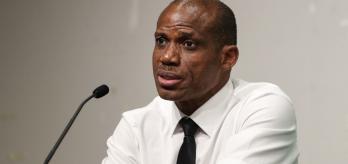Faryd Mondragón won 51 caps for his country over two decades. Having been part of the Colombia squad at the 1994 and 1998 World Cups, he rounded off his illustrious career by playing in the 2014 tournament at the age of 43. Before joining the TSG in Qatar, he sat down with us to talk about why each of his World Cups was a unique experience, the importance of experience for goalkeepers, how the 'keeper's role has evolved, and what we can expect to see from the men between the sticks when the 2022 tournament gets underway.
Watch interview
Five talking points
00:06
Three unique World Cups
As Faryd explains, each of his three tournaments was a unique experience. In 1994, as a 21-year-old, he was delighted just to be in the squad. In 1998, he had the responsibility of being number 1, and 2014 brought another new role, as he was asked to mentor a talented but inexperienced Colombian squad and show his team-mates the attitude you need to succeed at a World Cup. Playing in the 2014 tournament at the age of 43 was a fitting finale to a fine career.
04:11
Experience: there's no substitute
Young goalkeepers have some inherent advantages over veterans, particularly as far as speed, reflexes and agility are concerned. However, as Faryd knows only too well, there is no substitute for the experience you earn by playing games. This became especially apparent during that 2014 World Cup campaign, when he was the only player in the squad with experience of playing at that level, and coach José Pekerman brought him in specifically to mentor his team-mates.
05:55
South America and Europe – different schools of goalkeeping(?)
Having played extensively both in South America and in Europe, Faryd believes there are distinct approaches to goalkeeping on the two continents. Traditionally, South American goalkeepers tended to be very technically capable, whereas some European countries struggled to produce top-quality goalkeepers. This situation has changed recently, not least because goalkeepers are recognised as crucial to the success of their teams, and get a lot more specialist attention on the training pitch than they used to.
09:06
The role of the modern goalkeeper
The role of the goalkeeper has changed, in that goalkeepers are expected to be more involved in build-up play and be much more comfortable with the ball at their feet than before. However, Faryd is keen to stress that their primary role is still to protect their goal. A goalkeeper's fundamental task is to keep the ball out of the net; other skills have to be acquired in addition to the ability to stop shots, not instead of it.
11:16
The current generation
As you might expect from a player with experience on both sides of the Atlantic, Faryd has a long and varied list of goalkeepers he admires, including Brazil's Alison and Germany captain Manuel Neuer, but he is looking forward to seeing 32 outstanding goalkeepers in Qatar. The next month will give us a great opportunity to identify and analyse the latest goalkeeping trends, and to present that analysis to future generations of goalkeepers and coaches.













